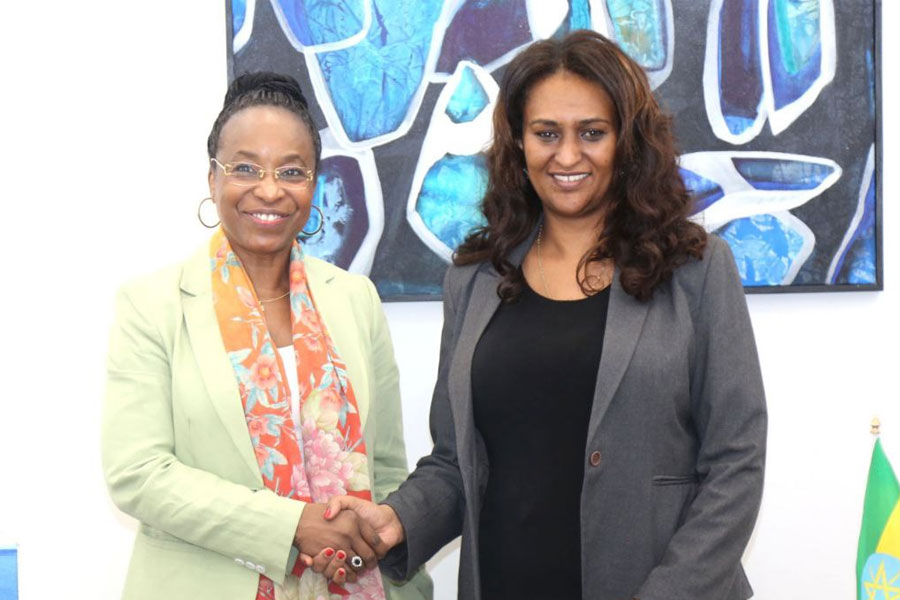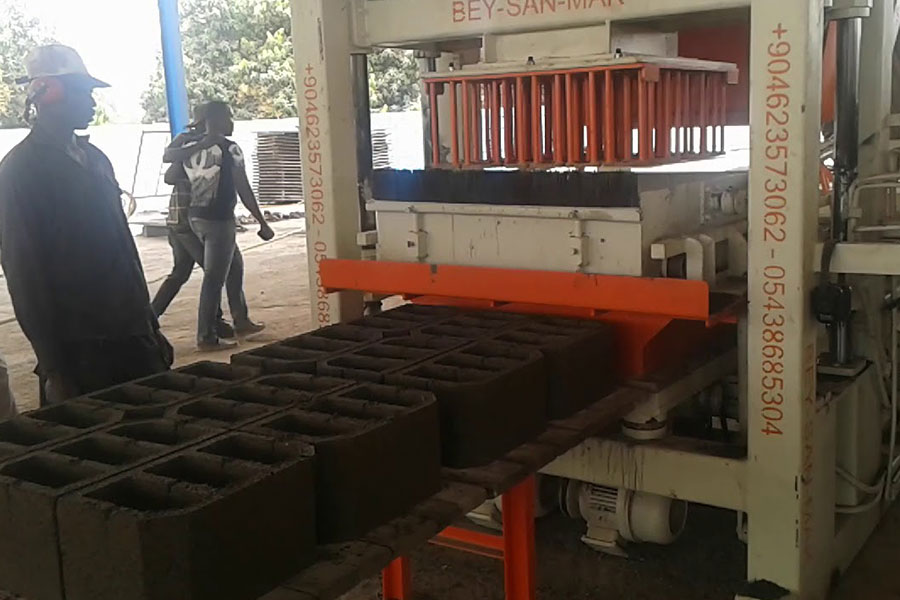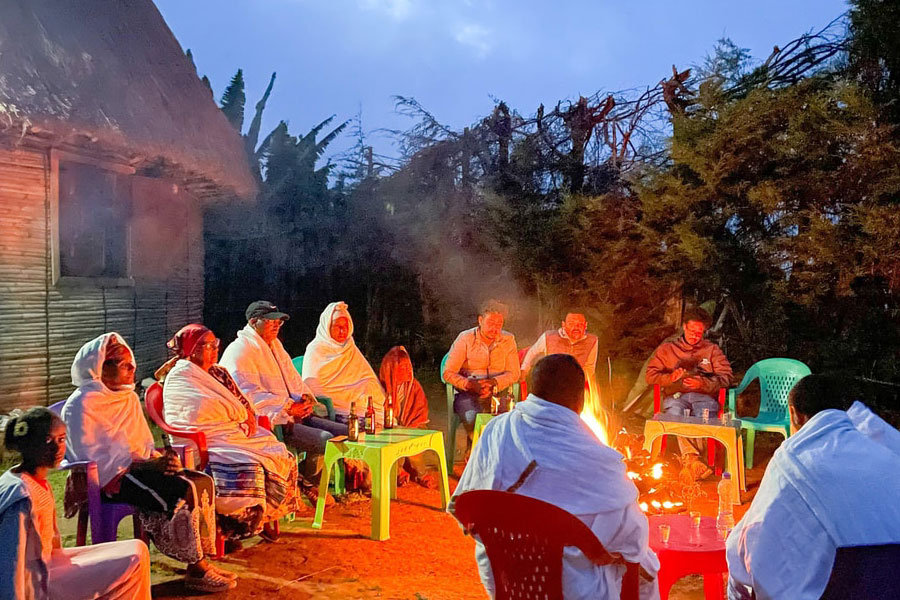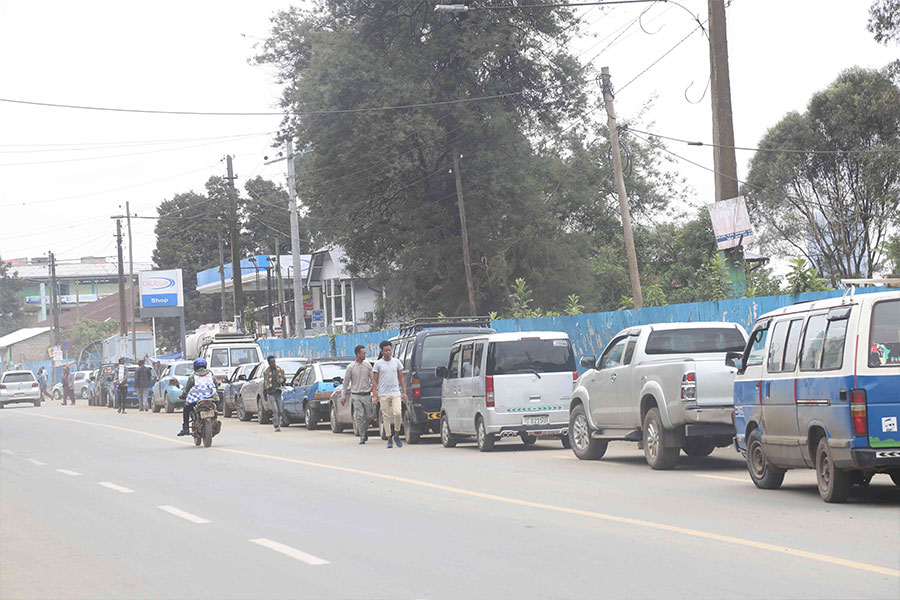
Fortune News | Feb 15,2020
Black and white markings on their legs and large semi-circular rimmed horns that stretch over a metre long are part of the endemic Walia Ibex's signature look. The Walia can weigh over 100Kg and is a rare sight, mostly found in the highlands of the Semien Mountain range near places like Gonder in Amhara Regional State. This was the hometown of Alemayehu Simegn (PhD), owner of the first Ethiopian-owned leather tannery in the country. After this well-known mountain goat, he named his company; he was proud of his country, and the animal's beauty was an allegory for his craftsmanship.
The former farmer learned the craft from his father, who traded in goat and sheepskins. He would make the 700Km journey from Gonder to Addis Abeba on foot - carrying animal skins and hides to supply tanneries in the city and to take sought-after supplies back to his hometown from the capital. His journey to owning one of the country's biggest tanneries was not a short one, but his company, Wallia Leather & Leather Products Plc, still stands to this day, 60 years on. But not unlike the precious Walia Ibex, it's existence is critically endangered.
There have been many developments in the leather industry scene since Alemayehu ventured into the business, including the proliferation of tanneries and manufacturers engaged in the sector. Today there are 27 leather tanneries in the country, processing skins and hides to produce leather for both export and local consumption. Large-scale manufacturers of leather products like bags, shoes and gloves number 44. Simultaneously, around 1,000 medium and small enterprises are engaged in the industry, with most producing goods for the local market.
But, for the most part, the industry has so far not managed to maximise its gains by manufacturing value-added products. It remains producing mainly raw or, at best, semi-processed products for the export market. As of late, members of the industry sent out an SOS after sustaining heavy losses that have brought their industry to its knees. Distressed executives have presented a request letter to the prime minister's macroeconomic team with calls for support.
In the past 10 years alone, nearly 30 manufactures have either been neck-deep in unpaid loans or have gone under, according to data from the Ethiopian Leather Industries Development Association, which also includes the Skins & Hides Suppliers Association, a body with over 15,000 members.
Though it is brimming with potential, the challenges facing this industry are manifold. The country possesses the largest livestock population on the continent with over 123 million heads of cattle, sheep and goats. Unfortunately, quantity has long trumped quality.
Environmental factors, feed and overall living conditions of the livestock play a big role in the quality of their hides and skins, according to Hailekiros Debesay, deputy director at the Leather Industry Development Institute.
"The majority of problems in quality arise before the animals are slaughtered," he said. "It's hard to remove the skin of the cattle because of such problems."
From over 20 million livestock that are slaughtered each year, barely 10pc qualify for the three grades of proffered hide quality distinction. The remainder is considered sub-standard. Commercialisation solutions are desperately needed here as most hides and skins are sourced from people's backyards following major holidays celebrated in the country. The people that go through neighbourhoods collecting these hides carry them around far longer than they should without preservatives.
The diminished quality undoubtedly affects export earnings, explained the Deputy Director of the Institute, which has been supporting the industry for nearly two decades. It works on research and development, consulting, training and education.
Twenty-seven leather tanneries in the country process skin and hides to produce leather for both export and local consumption, while 44 large-scale manufacturers make leather products like bags, shoes and gloves.
The impact of the Novel Coronavirus (COVID-19) gravely affected the industry's export earnings; amassing only 36pc of its intended goal in the last fiscal year at 73 million dollars. The dwindling forex earnings have left the tanneries cash-strapped for buying essential chemicals for leather processing through their own retention accounts. This has forced many to join the long queue for forex at banks.
Kangaroo Shoe Factory, a 30-year-old industry veteran, has been waiting for over a year now. The company, which specialises in leather shoes, used to get around 300,000 dollars every few months in the past, according to Yosef Behabtu, managing director of the company.
"We're now sourcing some materials locally at a much higher price," he said. Operating at 20pc of its production capacity, it imports nearly all raw materials aside from its leather from the outside market. Its minimal export to countries like Italy and Germany had helped it mitigate the dearth of forex, but COVID-19 took away that consolation.
"We used to purchase spare parts and tend to other immediate needs," said Yosef. "It has reached a concerning stage for us. The industry has also lost its priority status in forex allotment."
Raw materials for manufacturing industries and agricultural inputs such as fertiliser, pesticides, chemicals and seeds are now second to importers of medicine in the waiting list for forex.
Kangaroo catered largely to a local client base, but companies that focused on the local market have seen their earnings slashed by more than half. Ethio-Leather Industry Plc (ELICO), a state-owned turned private company, is a prime example.
Elico, which exports 60pc of its products, used to average around five million dollars a year in earnings but may have to settle for less than one million dollars this year, according to Abebe Teklu, managing director at ELICO, which operates with over 1,800 employees and has been privately owned for 25-plus years.
The pandemic is the culprit here, shutting down markets like Italy, India and China - the company's main export destinations.
"There were times when it used to generate up to seven million dollars annually," said Abebe. "But standing at the half-year point, we have had to reassess our expectations for this year."
The letter to the Prime Minister addressed these issues and more. The flooding of the local market with cheaper imported products, an agenda now more relevant than ever with the country set to join the World Trade Organisation (WTO), is another subject included in the call for assistance.
The Association, which has penned this letter on behalf of its 120 members, is requesting higher import taxation on leather goods. It argues that the export of its industry is bolstered by revenues from the local market that help it recover costs and allow it to offer competitive prices on the global market. Manufacturers mainly from India and China bring products that it cannot compete with in price, a claim recognised by the Ministry of Trade & Industry.
The biggest problem, however, remains finance. Short-term maturity loans and high-interest rates have inundated some manufacturers and placed others on the verge of defaulting. High costs for mandatory tannery treatment centres and a competing synthetics market compound the issue.
But the country's recent switch to the current administration's Homegrown Economic Reform Agenda appears promising to some in the industry. Discussions, though still underway by the macroeconomic team, have reached some points of understanding, according to Eshete Asfaw, state minister for Trade & Industry.
"A legal framework for a policy on quality is being crafted by the Ministry and nearing completion," he said. "The quality of products will allow for more consumption by the local market."
Taxes on imports are also expected to increase to protect the local market, according to Eshete.
The ever-burning issue of foreign currency shortage seems to have reached a potential resolution as 45pc of the country's total forex earnings is earmarked to go toward the industrial sector, according to Eshete.
"The accession to the WTO has brought a focus to the quality of products being produced here for the local market as well as export. This will also apply to products being imported," said Eshete.
The Ministry also says it is facilitating bank loans for manufacturers who will be expected to produce plans for loan repayment as part of the application process.
Funding has also been secured from the World Bank, explained Eshete, to enhance capacity building of quality assessment and research institutions under the Ministry, which is expected to enhance knowledge transfer and technological aspects of the industry.
Imposing higher taxes may not be feasible or advisable when the country joins the WTO, according to Tsegaye Gebrekidan (PhD), an economist at the Policy Studies Institute.
"There are certain instances where this might be possible, but it can't go far," he said. "Doing this may also have reciprocal effects from other countries to Ethiopia."
Instead, Tsegaye advises on working on the fundamental problems that plague the industry. The lack of skill across the value chain and the quality of raw materials like hides and skins need more attention instead, according to him.
However, formulating a standard policy is legal under the WTO framework and will ultimately benefit not just the local producers but also the consumers as well, according to the expert.
He also pointed out that common waste treatment plants, which have hit a snag in development, will also reduce costs.
"The waste treatments ensure that environmental standards are being met and will have beneficial spillover effects," he said. "It will also make the host communities have a positive reception to the industry."
Looking into reusing waste from the processing of hides and skins is also another option, he added.
The WTO's accession signals that the country is open and favourable to business, it will also open up doors elsewhere for Ethiopian-made products. Industry players' ability to stay competitive will largely predict their success in penetrating markets and making the most of the advantages the ascension could entail.
In addition to the support and facilitation from government institutions and banks, the Leather Industries Development Association is itself taking steps to remedy the situation. It has initiated the process to acquire a state-of-the-art shop on Bole International Airport's premises in the capital. Through an estimated 50-million-dollar investment, the planned 3,000Sqm shop is hoped to vend quality leather products to travellers from all over the world. The Association is looking to bolster its revenue by capitalising on the market of millions of travellers that pass through the airport every year.
Perhaps the industry can even attain its export revenue target of 2.4 billion dollars 10 years from now. Only time will tell.
PUBLISHED ON
Dec 26,2020 [ VOL
21 , NO
1078]

Fortune News | Feb 15,2020

Fortune News | Sep 24,2018

Radar | Feb 03,2024

Editorial | Nov 27,2021

Fortune News | Apr 30,2022

My Opinion | Mar 04,2023

Viewpoints | Mar 18,2023

Agenda | Sep 28,2024

Fortune News | Mar 28,2020

Agenda | Jul 09,2022

Dec 22 , 2024 . By TIZITA SHEWAFERAW
Charged with transforming colossal state-owned enterprises into modern and competitiv...

Aug 18 , 2024 . By AKSAH ITALO
Although predictable Yonas Zerihun's job in the ride-hailing service is not immune to...

Jul 28 , 2024 . By TIZITA SHEWAFERAW
Unhabitual, perhaps too many, Samuel Gebreyohannes, 38, used to occasionally enjoy a couple of beers at breakfast. However, he recently swit...

Jul 13 , 2024 . By AKSAH ITALO
Investors who rely on tractors, trucks, and field vehicles for commuting, transporting commodities, and f...

Oct 25 , 2025
The regulatory machinery is on overdrive. In only two years, no fewer than 35 new pro...

Oct 18 , 2025
The political establishment, notably the ruling party and its top brass, has become p...

Oct 11 , 2025
Ladislas Farago, a roving Associated Press (AP) correspondent, arrived in Ethiopia in...

Oct 4 , 2025
Eyob Tekalegn (PhD) had been in the Governor's chair for only weeks when, on Septembe...